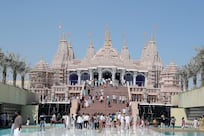MEIKHTILA, MYANMAR // Myanmar's army took control of a ruined central city today, imposing a tense calm after several days of clashes between Buddhists and Muslims left piles of corpses in the streets and buildings ablaze in the worst sectarian bloodshed to hit the country this year.
Truckloads of soldiers patrolled Meikhtila, taking up positions at intersections and banks as authorities delivered food and water to thousands of displaced Muslims who fled. Some residents, who had cowered indoors since the mayhem began on Wednesday, emerged from their homes to inspect the destruction in which at least 28 people died.
President Thein Sein, a former general who vowed to bring democracy to Myanmar after half a century of military rule, imposed a state of emergency in the region on Friday. The unrest was the first of its kind in the country since two similar bouts of bloodshed shook western Rakhine state last year, and its spread underscores both the immense challenges of reform and the government's failure to rein in anti-Muslim sentiment in a predominantly Buddhist nation. Even monks have armed themselves and staged anti-Muslim rallies, taking advantage of new-found freedoms.
It was not immediately clear which side bore the brunt of the latest unrest, but at least five mosques were torched, and terrified Muslims, who make up about 30 per cent of Meikhtila's 100,000 inhabitants, have stayed off the streets as their shops and homes burnt and Buddhist mobs carrying machetes and hammers tried to stop firefighters from dousing the flames.
"Calm has been restored after troops took charge of security," said Win Htein, an opposition legislator from Meikhtila. "So far, nearly 6,000 Muslim people have been relocated at a stadium and a police station for their safety."
Residents said rescue workers and volunteers were arriving from other towns to help, and that local Buddhists were giving food and water to displaced Muslims. Some Buddhists sought shelter at local monasteries.
Little appeared to be left of some palm tree-lined neighbourhoods, though, where the legs of victims could be seen poking out from smouldering masses of twisted debris and ash. Broken glass, destroyed motorcycles and overturned tables littered roads beside rows of burnt-out homes and shops, evidence of the widespread chaos that swept the town.
The devastation in Meikhtila was reminiscent of last year's clashes between ethnic Rakhine Buddhists and Muslim Rohingya that left hundreds of people dead and more than 100,000 displaced - almost all of them Muslim. The Rohingya are widely perceived as illegal migrants and foreigners from Bangladesh; the Muslim population of Meikhtila is believed to be mostly of Indian origin.
Residents and activists said the police did little to stop the rioters or reacted too slowly, allowing the violence to escalate. "They were like scarecrows in a paddy field," San Hlaing said.
Khin Maung Swe, 72, a Muslim lawyer who said he lost all his savings, also complained authorities did nothing to disperse the mobs.
"If the military and police had showed up in force, those troublemakers would have run away," he said, inspecting the remains of his damaged home. "There would have been no violence if the security forces had just fired shots into the air to scare them away."
* Associated Press




